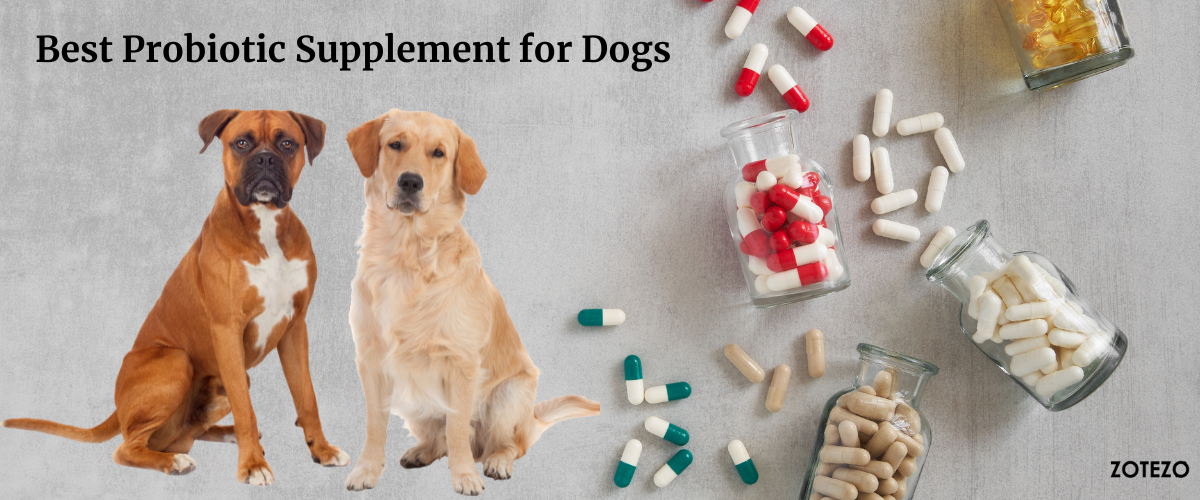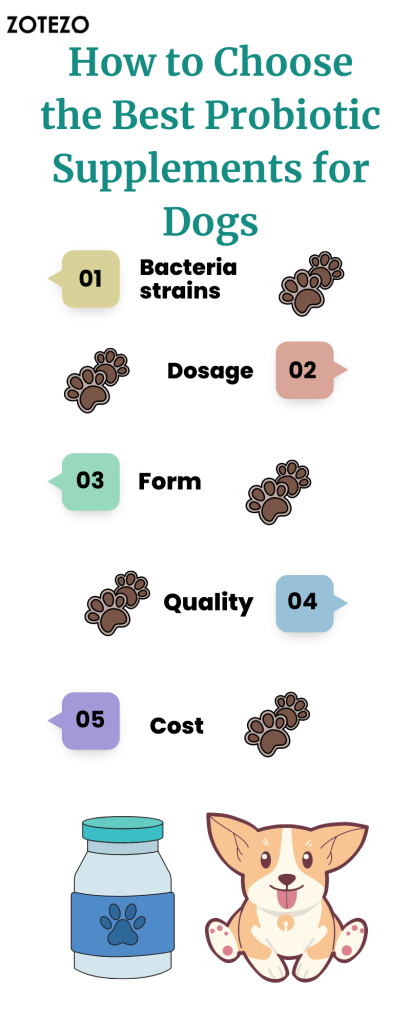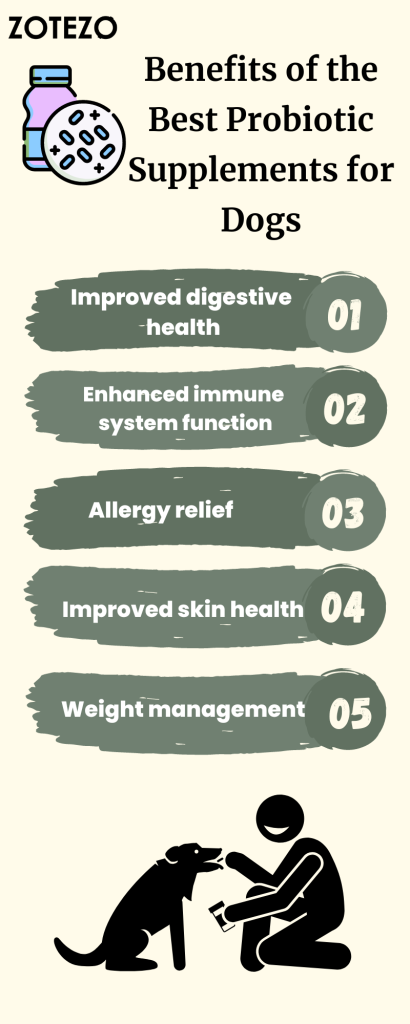Introduction
Probiotics are live microorganisms similar to the beneficial organisms in the human gut. When given to dogs, the best probiotic supplements for dogs can help to maintain a healthy balance of bacteria in the digestive system and support overall digestive health.
Many different probiotic supplements are available for dogs, and it’s essential to choose a high-quality product formulated specifically for dogs. Some factors to consider when selecting a probiotic supplement for your dog include the type and number of bacteria strains it contains, the viability of the bacteria (how many are still alive when the product is consumed), and whether it has been tested for purity and safety.
So, keeping all this in mind, we have made a list of the Best joint supplements and Best Probiotic Supplements for Dogs in the World. Let’s dig in to learn everything about Probiotic Supplements for Dogs without wasting more of your precious time.

Find The Best around the world
Australia
Canada
France
Germany
India
Italy
Japan
Netherlands
Singapore
Spain
Sweden
UAE
UK
USA
Tips for choosing the right Probiotics for Dogs for you
When selecting a probiotic supplement for your dog, there are a few key factors to consider:
Bacteria strains
Different probiotic supplements contain different combinations of bacteria strains, and some strains may be more effective for specific health conditions. Look for a supplement that includes a variety of strains, including Lactobacillus and Bifidobacterium, as these are commonly found in the digestive systems of healthy dogs.
Dosage
The dosage of probiotics will depend on the size of your dog and the specific health concerns you are addressing. Be sure to follow the dosage instructions on the product label, or consult with a veterinarian for guidance.
Form
Probiotic supplements come in various forms, including powders, capsules, and chewables. Consider your dog’s preference and ability to take the supplement when choosing the format.
Quality
Look for a reputable brand that uses high-quality ingredients and follows good manufacturing practices. It’s also a good idea to choose a product that has been third-party tested for purity and potency.
Cost
Probiotic supplements can vary widely in price. Consider your budget and any benefits the product may offer, such as added prebiotics or enzymes, when deciding on a supplement.
Remember to consult a veterinarian before starting your dog on any new supplement, as they can help determine the appropriate type and dosage for your dog’s specific needs.
Advantages of using Probiotics for Dogs
Probiotics can offer a range of potential benefits for dogs, including:
Improved digestive health
Probiotics can help balance the levels of good bacteria in the gut, which may get disrupted by stress, diet, or antibiotic use. This can help support a healthy digestive system and reduce the risk of digestive issues such as diarrhea and constipation.
Enhanced immune system function
Probiotics may help support the immune system by promoting good gut bacteria growth. This can help reduce the risk of infections and other illnesses.
Allergy relief
Some studies have shown that probiotics may help reduce the severity of allergic reactions in dogs.
Improved skin health
Probiotics may help support healthy skin by balancing the bacteria in the gut, which can affect skin health.
Weight management
Probiotics may help support weight loss by improving digestion and absorption of nutrients.
Types of Probiotic Supplements for Dogs
There are several types of probiotic supplements that can be beneficial for dogs. Some options include:
Lactobacillus
This type of probiotic is found in the digestive tract of animals and is thought to help with digestion and the absorption of nutrients.
Bifidobacterium
This type of probiotic is found in the large intestine and may help with digestion and the immune system.
Enterococcus
This type of probiotic is found in the small intestine and may help with digestion and the immune system.
Streptococcus
This type of probiotic is found in the digestive tract and may help with digestion and the immune system.
It’s important to note that not all probiotics are created equal, and it’s important to choose a high-quality product that is specifically formulated for dogs. It’s also a good idea to speak with a veterinarian before starting your dog on a probiotic supplement, as they can help determine the appropriate dosage and recommend the best product for your dog’s specific needs.
Disdvantages of using Probiotic Supplements for Dogs
Some potential side effects of probiotics for dogs may include the following:
Digestive issues
Probiotics may cause mild digestive upset in some dogs, such as gas, bloating, or diarrhea. This is usually temporary and you can manage it by reducing the dosage or frequency of the probiotics.
Allergic reactions
Some dogs may be allergic to certain probiotics or ingredients in the supplement. Signs of an allergic reaction may include skin irritation, vomiting, diarrhea, or difficulty breathing.
Interactions with medications
Probiotics may interact with certain drugs, such as antibiotics. It is essential to inform your veterinarian if your dog is taking any medicines before starting a probiotic supplement.
Who should use Probiotics for Dogs
Dogs may benefit from probiotics in various situations, including:
- Digestive issues: Probiotics can help restore balance to the gut microbiome and alleviate symptoms of diarrhea, constipation, or other digestive disturbances.
- Antibiotic treatment: Antibiotics can disrupt the natural balance of bacteria in a dog’s gut, leading to digestive upset. Probiotics can help replenish beneficial bacteria during and after antibiotic therapy.
- Stressful situations: Events such as travel, boarding, or changes in routine can stress a dog’s digestive system. Probiotics may help support digestive health during these times.
- Dietary changes: Switching to a new diet or introducing new foods can sometimes cause digestive upset in dogs. Probiotics can aid in the transition and support digestive health.
- Aging or illness: Older dogs or those with certain health conditions may benefit from probiotics to support overall gut health and immune function.
- Allergies and skin issues: Some research suggests that probiotics may help reduce inflammation and improve skin conditions associated with allergies in dogs.
Recommended Dosage of Probiotic Supplements for Dogs
The recommended dosage of probiotic supplements for dogs can vary depending on the specific product you are using and the size and health of your dog. It’s important to follow the dosage instructions provided by the manufacturer of the probiotic supplement you are using. If you are unsure about the correct dosage for your dog, you should consult with a veterinarian. They will be able to recommend the appropriate dosage based on your dog’s size, age, and health needs.
How to use Probiotic Supplements for Dogs
- Consult with a veterinarian: Before starting probiotic supplements for your dog, consult with a veterinarian to ensure it’s appropriate for your dog’s health needs and conditions.
- Choose the right supplement: Select a probiotic supplement specifically formulated for dogs, avoiding those designed for humans.
- Follow dosage instructions: Administer the probiotic supplement according to the manufacturer’s recommended dosage based on your dog’s size and weight.
- Introduce gradually: Introduce the probiotic supplement gradually into your dog’s diet to allow their digestive system to adjust.
- Incorporate into meals: Mix the recommended dosage of the probiotic supplement into your dog’s food, ensuring they consume it with their meal.
- Monitor for effects: Observe your dog for any changes in digestion, stool consistency, or overall health after starting the probiotic supplement.
- Maintain consistency: Administer the probiotic supplement consistently as directed, as regular use is important for optimal digestive health.
- Store properly: Store the probiotic supplement according to the manufacturer’s instructions to maintain its efficacy.
Do you represent a health, nutrition, beauty, or fitness brand?
Share your brand story, and its philosophy with our millions of readers looking for the highest quality products for their well-being. We understand that your products cater to the unique needs of an individual; here’s your opportunity to share the purpose and unique value proposition of your products that you’ve so caringly created for their well-being.
Share your brand story
Frequently asked questions on Probiotics for Dogs
1. What are the benefits of probiotics for dogs?
2. How do I give my dog a probiotic supplement?
3. How long does it take for probiotics to work in dogs?
4. Can I give my dog probiotics if they are on antibiotics?
5. Are there any risks or side effects associated with probiotics for dogs?
Are you a health, nutrition, beauty or fitness expert?
Inviting all health, fitness, beauty, and wellness experts from around the world to join Zotezo, the ultimate trust commerce platform, and empower millions to make the right decisions for their wellbeing. Share your knowledge, review the highest quality products, and provide valuable insights to our engaged audience. Together, let's create a healthier, happier world!
Join our expert advisory board
Conclusion
Probiotics are generally safe for dogs and may have several health benefits. These benefits include supporting healthy digestion, improving the balance of beneficial bacteria in the gut, and boosting the immune system. However, it is essential to use probiotics for dogs under a veterinarian’s guidance and be aware of potential side effects, such as digestive upset and allergic reactions.
Did we miss anything? Have you used any of the above-mentioned best probiotics for dogs? Did you find this article helpful? Remember to share your experience with us. Tell us about the one you choose as the Best Probiotic Supplement for Dogs in the World.






